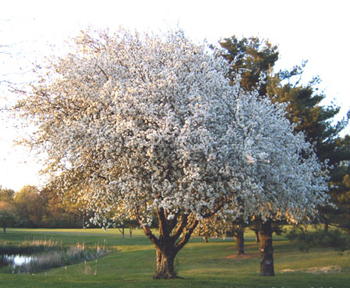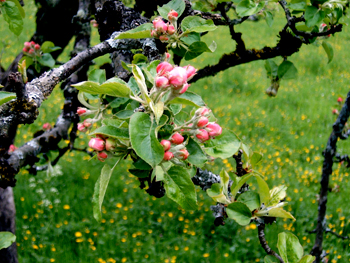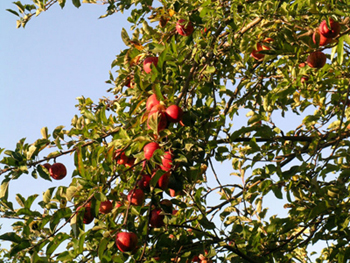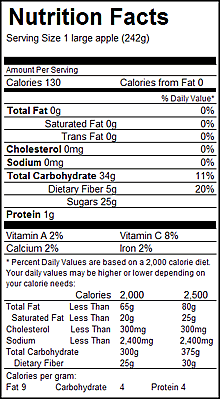Contents:
Common Names | Parts Usually Used | Plant(s) & Culture | Where Found | Medicinal Properties | Biochemical Information
Legends, Myths and Stories | Uses | Formulas or Dosages | Nutrient Content | How Sold | Warning | Resource Links | Bibliography
Scientific Names

- Pyrus malus L.
- Rose family
Common Names
- Apple
Parts Usually Used
Fruit and bark
Back to Top
Description of Plant(s) and Culture

The apple tree is a small deciduous tree with a dense crown and gray bark. The twigs are downy at first; toothed, elliptical pointed leaves grow with pink-flushed, white flowers on short side twigs. Flowers open with the leaves. Fruits are rounded green apples, depressed at each end, ripens in the fall.
Back to Top
Where Found

Cultivated throughout much of North America and naturalized in eastern United States, on the prairies, in southern Canada and the Pacific states.
Back to Top

Medicinal Properties
Astringent, laxative, diuretic
Back to Top
Biochemical Information
Carbohydrates, sodium, magnesium
Back to Top
Legends, Myths and Stories
Apples are rightly called the King of Fruits.
A case is reported of a man who saved apple seeds until he had accumulated a cupful. He then ate the entire amount and died.
In the 2nd century, Galen, the famous court physician to the emperors and the gladiators, prescribed apple wine as a cure-all for nearly every ailment.
Eating an apple a day and getting proper exercise will change your life from ill health to healthy. Most people overeat, causing ill health with the over-indulgence.
The Chinese word for apple (P. malus) is Lin-ch’in.
Apples are thought to originate in Southwest Asia, in the region between the Black Sea and the Caspian Sea. The diggings of Stone Age lake dwellers in central Europe show apple usage long before recorded history. The origin of the Trojan War was attributed to “the apple of discord”, a golden apple down in front of an assembly of gods by the goddess of hate, Eris. Inscribed on the apple were the words (For the Fairest). Hera, wife of Zeus, queen of the gods; Athene, goddess of wisdom; and Aphrodite, goddess of love; all wanted the apple. Paris, son of the King of Troy, was to decide which goddess got the apple. Hera offered him power and riches; Athene offered wisdom and fame; Aphrodite promised to give him the most beautiful woman in the world. Paris, with Aphrodite’s help, abducted Helen, the wife of a Greek king. His refusal to return her started the Trojan War.
Grimm’s Fairy Tales have at least four stories (taken from old folk tales) involving apples, including Snow White.
The lives of William Tell and Johnny Appleseed can also be considered in the folk tradition although they involved real people.
In Gerard’s time, an ointment made of pulp of apples, swine’s grease and rosewater was sold in shops to beautify face and take away roughness of skin. The juice of sour apples was rubbed on warts to remove them.
Back to Top
Uses
Apples regulate the digestive system, preventing constipation and stopping diarrhea; also neutralizing the effects of rich fatty foods. They help purify the blood, clear gout and rheumatism, and prevent gallstones. They also help to keep the teeth clean.
Tea made from apple tree bark is an old fashioned remedy. It is said to be a tonic, relieves biliousness and intermittent fever, helps digestion (too much stomach acid, eat sweet apples; not enough stomach acid, eat sour apples), dysentery, boils, insect stings, rabid dog bites, and toothache.
Peeled and grated apple relieves flatulence and diarrhea. A fasting diet of 1 or 2 days of unripe apples should do the job. As a laxative, eat 2 or more apples, very effective. Apple peels can be dried and made into a tea, recommended for rheumatism, regulates blood sugar in diabetes. Apple wine is an ancient cure-all, mentioned by Galen in the 2nd century AD. Wine at least 2 years old should be used. Apple juice will turn to apple cider and if aged will become hard apple cider with alcoholic content.
Studies show that apples can reduce blood cholesterol levels. According to one reference, the ordinary apple cider is not fit to be used.
Back to Top
Formulas or Dosages
Infusion: use
For diarrhea, eat a grated, peeled apple. Dried apple peels simmered in warm water help regulate digestion. For maximum benefit, eat
Back to Top
Nutrient Content

How Sold
In any supermarket
Back to Top
Warning
Apple seeds eaten in large quantities can be poisonous.
Back to Top
Resource Links
LiveStrong.com: Calories in One Red Apple
LiveStrong.com: Calories in a Whole Apple
FruitsandVeggiesMatter.gov: Apple
Bibliography
![]() The Herb Book
The Herb Book, by John Lust, Bantam Books, 666 Fifth Avenue, New York, NY. copyright 1974.
![]() The Herbalist Almanac
The Herbalist Almanac, by Clarence Meyer, Meyerbooks, publisher, PO Box 427, Glenwood, Illinois 60425, copyright 1988, fifth printing, 1994
![]() The Nature Doctor: A Manual of Traditional and Complementary Medicine
The Nature Doctor: A Manual of Traditional and Complementary Medicine, by Dr. H.C.A. Vogel; Keats Publishing, Inc., 27 Pine Street (Box 876) New Canaan, CT. 06840-0876. Copyright Verlag A. Vogel, Teufen (AR) Switzerland 1952, 1991
![]() The Complete Medicinal Herbal
The Complete Medicinal Herbal, by Penelope Ody, Dorling Kindersley, Inc, 232 Madison Avenue, New York, NY 10016, First American Edition, copyright 1993
 Earl Mindell’s Herb Bible
Earl Mindell’s Herb Bible, by Earl Mindell, R.Ph., Ph.D., Simon & Schuster/Fireside, Rockefeller Center 1230 Avenue of the Americas, New York, New York 10020
![]() Chinese Medicinal Herbs
Chinese Medicinal Herbs, compiled by Shih-Chen Li, Georgetown Press, San Francisco, California, 1973.
![]() Indian Herbalogy of North America
Indian Herbalogy of North America, by Alma R. Hutchens, Shambala Publications, Inc., Horticultural Hall, 300 Massachusetts Avenue, Boston, Massachusetts 02115, 1973
![]() Back to Eden
Back to Eden, by Jethro Kloss; Back to Eden Publishing Co., Loma Linda, CA 92354, Original copyright 1939, revised edition 1994
![]() Webster’s New World Dictionary
Webster’s New World Dictionary, Third College Edition, Victoria Neufeldt, Editor in Chief, New World Dictionaries: A Division of Simon & Schuster, Inc., 15 Columbus Circle, New York, NY 10023
 An Instant Guide to Medicinal Plants
An Instant Guide to Medicinal Plants, by Pamela Forey and Ruth Lindsay, Crescent Books (January 27, 1992).
 Old Ways Rediscovered
Old Ways Rediscovered, by Clarence Meyer, Meyerbooks, publisher, PO Box 427, Glenwood, Illinois 60425, published from 1954, print 1988
 The Rodale Herb Book: How to Use, Grow, and Buy Nature’s Miracle Plants (An Organic gardening and farming book)
The Rodale Herb Book: How to Use, Grow, and Buy Nature’s Miracle Plants (An Organic gardening and farming book), edited by William H. Hylton, Rodale Press, Inc. Emmaus, PA, 18049., 1974
